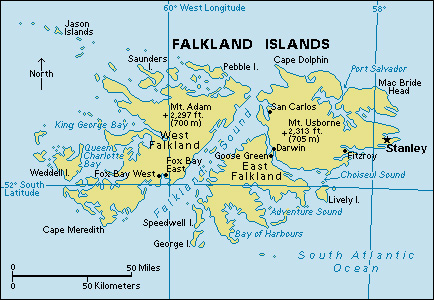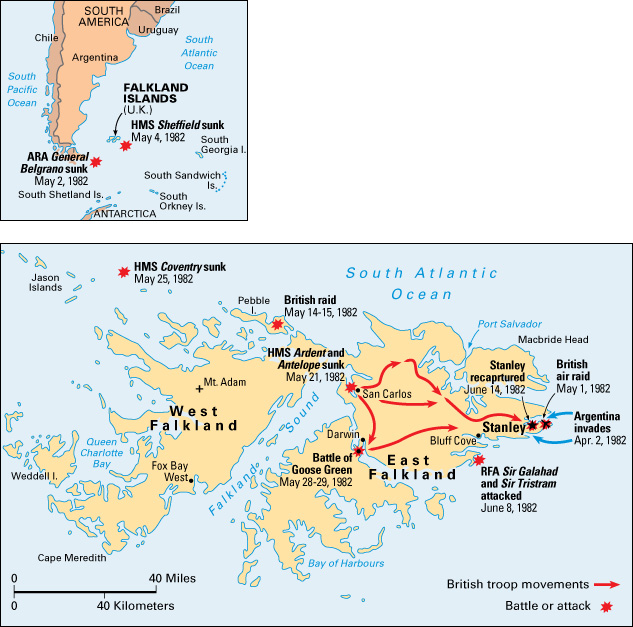Falklands War is the name given in the United Kingdom and the Falkland Islands to a conflict that took place from April to June 1982 between military forces of the United Kingdom and Argentina . It is also known as the Falklands Conflict. During this confrontation, the United Kingdom won back possession of the Falkland Islands from an occupying force of Argentines. In Argentina, the islands are known as the Islas Malvinas.

The Falklands War was, strictly speaking, a military confrontation, since neither side made an official declaration of war. However, there were a series of pitched battles and attacks on shipping, in which nearly 1,000 British and Argentine service personnel and civilians died.
Background to the war.
The underlying cause of the conflict was the dispute over possession of the Falkland Islands, which had been under British administration since 1833. In 1965, the United Nations (UN) passed a resolution calling on the United Kingdom and Argentina to settle the matter by negotiation, but little was done. In March 1982, a group of Argentines claiming to be scrap-metal dealers landed on South Georgia, an island close to the Falklands and part of the Falkland Islands Dependency, and raised the Argentine flag. At that time, General Leopoldo Fortunato Galtieri served as president of Argentina. He was a member of a military junta (small group that takes over a government and rules by decree) that had taken control of Argentina in 1976. Galtieri saw an opportunity to distract the Argentine people’s attention from the country’s domestic problems. He mobilized their support in capturing a territory that Argentina had long claimed as its own. On April 2, 1982, Argentina invaded the Falklands. It captured South Georgia on April 4.

Margaret Thatcher , the British prime minister, was herself leading an unpopular government. She immediately authorized the raising of a task force to regain the Falklands. The main difficulty was the fact that the islands were 7,500 miles (12,000 kilometers) away from the United Kingdom. The government received the almost unanimous backing of the UN and especially the United States . The United Kingdom task force set sail on April 5, and on April 7, the United Kingdom declared a 186-mile (300-kilometer) exclusion zone around the Falklands.
The actual period of fighting
lasted from the end of April until mid-June. On April 25, British forces recaptured South Georgia. On May 1, the British Royal Air Force bombed the airport at Port Stanley, the capital of the Falkland Islands. A naval bombardment by British forces began the same day. On May 2, the British submarine Conqueror torpedoed Argentina’s only battle cruiser , General Belgrano, outside the exclusion zone. The cruiser sank with the loss of 368 men.
On May 4, an Argentine aircraft sank the British destroyer Sheffield, with the loss of 21 seamen. The Sheffield became the first of the United Kingdom’s ships to fall victim to the French-made Exocet missile, an advanced weapon that used electronic technology. On May 25, the Atlantic Conveyor was also sunk by an Exocet, and the destroyer Coventry was bombed. Meanwhile, British forces had established themselves on the Falkland Islands. Following a raid on West Falkland on May 14, Royal Marines and paratroopers had come ashore at San Carlos, East Falkland, on May 21 and set up a beachhead from which to reoccupy the islands. The British won battles at San Carlos, Darwin, and Goose Green, but with losses that included 17 paratroopers at Goose Green and two ships, Ardent and Antelope, at San Carlos. The Argentines lost about 20 aircraft shot down at San Carlos, and 250 men killed and 1,200 taken prisoner at Darwin and Goose Green.
British forces next began an attack on Port Stanley, but Argentine bombing raids continued. On June 8, about 50 soldiers and seamen died in air attacks on the British troop ships Sir Galahad and Sir Tristram off Bluff Cove. On June 14, following battles at Mount Longdon and Mount Tumbledown, the Argentines surrendered.
Results of the war.
The loss of hundreds of lives and the destruction of several ships and aircraft shocked politicians and the public alike. It opened their eyes to the devastating power of the new electronic weaponry. The main direct result of the war was the removal from power of Argentine General Galtieri and the collapse of military rule. In 1983, Galtieri was tried in a military court and imprisoned for starting and losing the war. That same year, democratic elections and civilian rule returned to Argentina. The British victory strengthened the reputation of Thatcher, and many people claimed that it provided a so-called Falklands factor that helped her and the Conservative Party win the 1983 general election in the United Kingdom.
